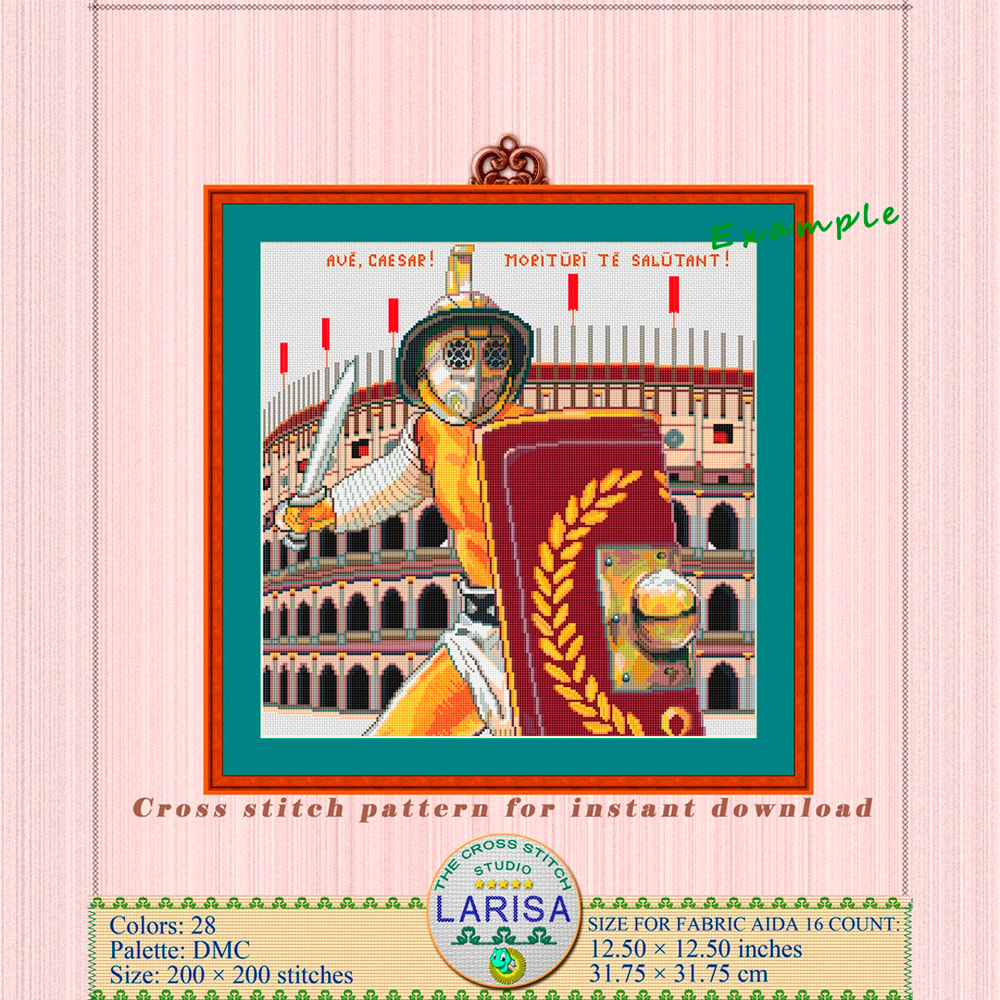Gladiator Cross Stitch Pattern | Murmillo | Colosseum
Gladiator cross stitch pattern
🔎 Gladiator | Murmillo | Colosseum: cross stitch pattern, printable cross stitch, PDF pattern, printable PDF pattern.
🔔 Only digital format. 🔎 The pattern comes in .PDF format.
✎ “Avē, Imperātor, moritūrī tē salūtant” is a well-known Latin phrase quoted in Suetonius, De Vita Caesarum. Variant wordings include “Avē Caesar” and “Moritūrī tē salūtāmus” - the latter in the 1st person (“We who are about to die salute you“) - and a response in 15th-century texts of “Avete vos” (“Fare you well“). Despite its popularization in later times, the phrase is not recorded elsewhere in Roman history. Historians question whether it was ever used as a customary salute.
★ Pattern specification for different types of fabric
• Fabric: 16 count White Aida.
• Colors: 28. Palette: DMC.
• Size: 200 × 200 stitches.
• Finished size will vary depending on the count fabric/canvas you choose.
✔ 14 count ⇒ Size: 14.29 × 14.29 inches | 36.30 × 36.30 cm
✔ 16 count ⇒ Size: 12.50 × 12.50 inches | 31.75 × 31.75 cm
✔ 18 count ⇒ Size: 11.11 × 11.11 inches | 28.22 × 28.22 cm
💾 5 PDF includes:
1. FIVE SCHEMES (Fabric: 16 count White Aida):
• Color Blocks with Symbols.
• Color Symbols.
• Color Blocks.
• Color Crosses.
• Black and White Symbols.
2. Color photo for reference.
3. List of DMC thread colors (instruction and key section).
🔔 Please note this is a digital pattern only! No fabric, floss, or other materials are included in the listing.
⛔ Returns & exchanges. This is a digital product and I don’t accept returns, exchanges, or cancellations.
❤ Feel free to contact me if you have any further questions.
❋❋❋❋❋❋❋❋❋❋
✎ Reference Information.
🔎 A gladiator (Latin: gladiator, “swordsman”, from gladius, “sword”) was an armed combatant who entertained audiences in the Roman Republic and Roman Empire in violent confrontations with other gladiators, wild animals, and condemned criminals.
🔎 The Colosseum or Coliseum also known as the Flavian Amphitheatre (Amphitheatrum Flavium, Anfiteatro Flavio or Colosseo, is an oval amphitheatre in the centre of the city of Rome, Italy. Built of travertine limestone, tuff (volcanic rock), and brick-faced concrete, it was the largest amphitheatre ever built at the time and held 50,000 spectators.
🔎 Irrespective of their origin, gladiators offered spectators an example of Rome’s martial ethics and, in fighting or dying well, they could inspire admiration and popular acclaim. They were celebrated in high and low art, and their value as entertainers was commemorated in precious and commonplace objects throughout the Roman world.
🔎 The gladiator games lasted for nearly a thousand years, reaching their peak between the 1st century BC and the 2nd century AD. The games finally declined during the early 5th century after the adoption of Christianity as state church of the Roman Empire in 380, although beast hunts (venationes) continued into the 6th century.
🔎 The Colosseum could hold an estimated 50,000 to 80,000 spectators during phases of its various renovations over the centuries, having an average audience of some 65,000; it was used for gladiatorial contests and public spectacles such as mock sea battles (for only a short time as the hypogeum was soon filled in with mechanisms to support the other activities), animal hunts, executions, re-enactments of famous battles, and dramas based on Classical mythology.































